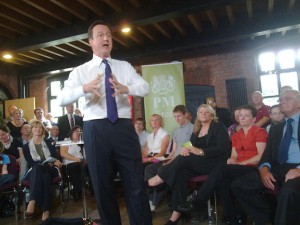I have mixed feelings about the Big Society. I’m all for devolution and more decision making power for communities, but I worry that the coalition’s plans will see local accountability suffer as more and more public services are provided by charities, private companies and social enterprises who are not subject to transparency legislation such as the Freedom of Information Act.
So today, at Austin Court in Birmingham I had the opportunity to put this question directly to the Prime Minister, David Cameron;
With the Big Society empowering charities, private companies and social enterprises to take on public services what are you going to do to ensure that communities themselves can effectively hold those providers to account?
You can watch the whole questioning session in the video at the bottom, with my question and the PM’s answer at 45:55.

I wasn’t entirely satisfied with the answer, to be honest. I had contemplated adding a bit at the end about Freedom of Information Requests but I decided not to risk pigeon-holing the answer into one area and to see what the PM came up with.
He seemed to say that accountability would come from two places; take up of services and local authority oversight.
Firstly he said that the Government would pay on results and so public service providers would have to get the users to justify the funding suggesting that those providers not doing a good job would lose users and thus funding. The big mental barrier I have with this – and the whole big society idea (which I generally welcome) – is how it works in practice. For example, if Lichfield District Council outsource bin collections to a private company who do a rubbish (‘scuse the pun) job where do I go? Will I actually have a choice of who collects my bins without moving outside the area? What if the schools my nephews go to are taken over by a local charity who do a poorer job? My sisters won’t be able to move to another catchment area for a different school so my nephews will be stuck with a lower standard of education because of where they live and no chance to improve their prospects.
The second was more worrying. “Empowering local government” and making sure they have an overseeing role just sounds very thin to me. There was no mention of how local government would actually oversee those providers and ensure they are accountable to the community. More, that didn’t really answer the question because local government is not the local community and I asked how the community can hold providers to account.
I was hoping he’d go further, but he didn’t. I was hoping to hear that the FoI Act would be expanded to include all public service providers, regardless of sector. It wasn’t forthcoming and I’m still left with the same feeling.
That the Big Society sounds like it could really work. Devolving decision making power and making Government less controlling and more supportive. But it doesn’t feel like the implementation of the idea has been thought through, and I get the sense that too little has gone into thinking about the consequences of what the shift in power could really mean.
At least if central Government is more proselytising we know who to shout out if it goes wrong. If power is in the hands of many though, who do we turn to when we need to question that authority?
I’ll be writing to my MP about this to see if he can shed any more light. In the meantime I’d appreciate your thoughts, too.
Number 10 have taken the video down, sorry.
Leave a Reply